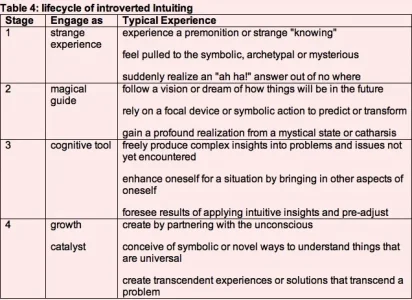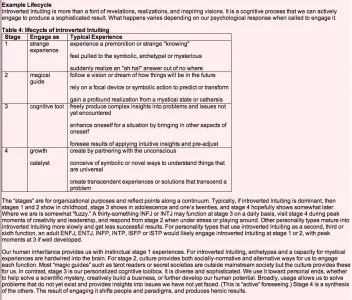U
Untitled
I found this description by Dario Nardi (INTJ) of how the Ni function develops through life and how dominant Ni differs from "the lesser Nis"  Aux & tertiary.
Aux & tertiary.
What are your thoughts on it?
(CLick on the image to read the description)Example Lifecycle
Introverted Intuiting is more than a font of revelations, realizations, and inspiring visions. It is a cognitive process that we can actively engage to produce a sophisticated result. What happens varies depending on our psychological response when called to engage it.

The “stages” are for organizational purposes and reflect points along a continuum. Typically, if introverted Intuiting is dominant, then stages 1 and 2 show in childhood, stage 3 shows in adolescence and one’s twenties, and stage 4 hopefully shows somewhat later. Where we are is somewhat “fuzzy.” A thirty-something INFJ or INTJ may function at stage 3 on a daily basis, visit stage 4 during peak moments of creativity and leadership, and respond from stage 2 when under stress or playing around. Other personality types mature into introverted Intuiting more slowly and get less successful results. For personality types that use introverted Intuiting as a second, third or sixth function, an adult ENFJ, ENTJ, INFP, INTP, ISFP or ISTP would likely engage introverted Intuiting at stage 1 or 2, with peak moments at 3 if well developed.
Our human inheritance provides us with instinctual stage 1 experiences. For introverted Intuiting, archetypes and a capacity for mystical experiences are hardwired into the brain. For stage 2, culture provides both socially-normative and alternative ways for us to engage each function. Most “magic guides” such as tarot readers or secret societies are outside mainstream society but the culture provides these for us. In contrast, stage 3 is our personalized cognitive toolbox. It is diverse and sophisticated. We use it toward personal ends, whether to help solve a scientific mystery, creatively build a business, or further develop our human potential. Broadly, usage allows us to solve problems that do not yet exist and provides insights into issues we have not yet faced. (This is “active” foreseeing.) Stage 4 is a synthesis of the others. The result of engaging it shifts people and paradigms, and produces heroic results.
Note: A person “engages” a function. This does not necessarily mean the person consciously decides to use the function. Rather, the person as an organism or whole system is engaging in the function. A person might engage a function unconsciously. This definition moves us away from thinking of functions as entities or “homunculi” that act separately from the organism.
http://www.darionardi.com/functions.html
What are your thoughts on it?
Attachments
Last edited by a moderator:


